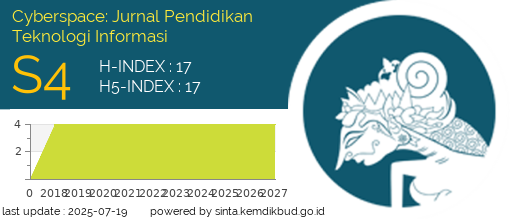OVERVIEW OF PIRATED SOFTWARE ON CAMPUS: EDUCATORS' PERSPECTIVE
DOI:
https://doi.org/10.22373/cj.v4i2.7717Keywords:
pirated software, original software, teaching staff, Copyright LawAbstract
This research was conducted in order to get an overview from the teaching staff on pirated software. The results acquired were an overview about pirated software, the use of pirated software, the price and willingness to switch to original software. In general, the perception of respondents stated that they knew about pirated software (66.67%), those who did not know (28.07%) and a small proportion were still in doubt (5.26%) regarding this matter. However, almost half of the respondents said that they did not know that the laptop used pirated software (49.12%) and those who knew about it are 21.05%. Small proportion of respondents (19.82%) are still in doubt whether their laptop uses pirated software or not. Respondents who agree (62.28%) original software is expensive, are willing to buy (72.81%) do not want to buy and are hesitant (20.18%). Respondents who disagreed (17.54%) original software was expensive, hesitant to obtain it legally (7.02%). The use of pirated software takes other people's rights (77.19%) and also violates the Copyright Law (79.82%) and disagrees (12.28%) on this. Respondents who were still in doubt were 10.53% and 7.89%. Respondents want to switch (72.81%), not willing (7.02%). The hesitation to move is 20.18%. Only a small proportion (27.19%) of respondents who do not know where to buy it, those who know (41.23%). Not sure where to get it (31.58%).
References
A. Mardalis and D. P. S, “Faktor-Faktor Yang Mempengaruhi Penggunaan Software Bajakan Di Kalangan Mahasiswa,” BENEFIT J. Manaj. dan Bisnis, vol. 16, no. 2, pp. 99–105, 2012.
U. DAMAYANTI, “Tinjauan Kriminologis Pembajakan Produk Microsoft (Windows 7) Di Kalangan Mahasiswa Universitas Tadulako,” J. Ilmu Huk. Leg. Opin., vol. 3, no. 3, 2015.
A. P. Wicaksono and D. Urumsah, “Perilaku Pembajakan Produk Digital: Cerita Dari Mahasiswa di Yogyakarta,” J. Apl. BISNIS, vol. 17, no. 1, pp. 22–42, 2017.
F. H. Utami and Asnawati, Rekayasa Perangkat Lunak. Yogyakarta: Deepublish, 2015.
B. Satya, “Mengenal Sistem Operasi Yang Beredar Disekitar Kita,” J. DASI, vol. 11, no. 2, pp. 19–32, 2010.
P. H. Suputra, “Penggunaan Perangkat Lunak Berlisensi Publik,” JPTK, UNDIKSHA, vol. 7, no. 2, pp. 29–38, 2010.
G. C. A. Kansil, “Perlindungan Hukum Terhadap Hak Cipta Programmer Dari Pembajakan Program Komputer,” Lex Priv., vol. VI, no. 6, pp. 37–44, 2018.
M. Sari, R. S. Sadjad, and M. Nadjib HM, “Tinjauan Hukum Media Massa Terhadap Penggunaan Software Bajakan Dikalangan Mahasiswa Di Kota Makassar,” J. Komun. KAREBA, vol. 1, no. 4, pp. 399–410, 2011.
D. Suryahartati, “Telaah Normatif Terhadap Lisensi Program Komputer Menurut Undang-Undang Nomor 19 Tahun 2002 Tentang Hak Cipta,” J. Ilmu Huk. Jambi, vol. 2, no. 1, pp. 16–30, 2011.
N. K. Sari, “Penegakan Hukum Terhadappelanggaran Hak Cipta Pembajakan Software Di Indonesia,” J. Ilm. Ilmu Huk. QISTI, vol. 6, no. 1, pp. 14–24, 2012.
S. Muzid and M. Munir, “Pengaruh Penggunaan Software Open Source Terhadap Pembajakan Software: Perspektif Mahasiswa,” in SNATI 2006, 2006, pp. 79–88.
H. Paserangi, “Harmonisasi Hukum Hak Cipta Program Komputer dengan Kultur Hukum Masyarakat Indonesia,” MMH, vol. 40, no. 3, pp. 313–324, 2011.
N. A. Rakhmawati, “SOFTWAREOPEN SOURCE, SOFTWARE GRATIS?” JUTI, vol. 5, no. 1, pp. 13–18, 2006.
Supanto, “kebijakan hukum pidana dalam penanggulangan pembajakan perangkat lunak komputer,” Mimb. Huk., vol. 19, no. 3, pp. 335–485, 2007.
A. Muqorobin, “Penggunaan Software Bajakan Di Lembaga Keuangan Syariah Dalam Perspektif Kepemilikan Islam (Studi Kasus Bmt Surya Mandiri, Ponorogo Tahun 2018),” in Manajemen, Akuntansi dan Perbankkan 2018, 2018, pp. 1003–1016.
Downloads
Published
Issue
Section
License
Authors who publish with Cyberspace Journal agree to the following terms:
- Authors retain copyright and grant the journal right of first publication with the work simultaneously licensed under a Creative Commons Attribution License that allows others to share the work with an acknowledgement of the work's authorship and initial publication in this journal.
- Authors are able to enter into separate, additional contractual arrangements for the non-exclusive distribution of the journal's published version of the work (e.g., post it to an institutional repository or publish it in a book), with an acknowledgement of its initial publication in this journal.
- Authors are permitted and encouraged to post their work online (e.g., in institutional repositories or on their website) prior to and during the submission process, as it can lead to productive exchanges, as well as earlier and greater citation of published work (See The Effect of Open Access).



















